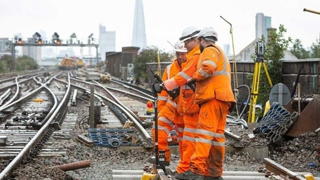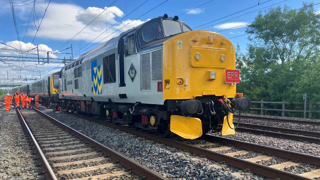There’s an art to negotiations. It’s knowing when to stand firm and when to give ground. It’s knowing clearly what your side needs and understanding what the other side needs.
At heart, negotiations are about compromise. But it’s rare that both sides are equal - one side usually has an advantage over the other.
So it is with the rail dispute. Talks have continued for months between the three main unions, Network Rail, and the train operators, as represented by the Rail Delivery Group.
The RMT represents signallers and track maintenance staff at Network Rail, as well as guards and station staff at the train operators. ASLEF represents drivers at train operators. TSSA (where members have voted to accept NR and train operator deals, to end their disputes) represents ‘white-collar’ staff at NR and train operators.
The RMT has been the most vocal in it’s negotiations with NR and RDG. In both cases, it has spent the last several months talking about pay and modernisation. I can only assume that all sides have approached these talks in good faith, discussing what changes are possible and how pay might rise as a result.
The employers’ side has been clear that it cannot afford pay rises without modernisation. In accepting talks, the RMT has implicitly accepted this position. The talks have produced offers from NR and from the RDG, with the most recent offers an improvement on the initial positions. Pay is slightly better and union negotiators have seen off aspects such as Driver Only Operation (DOO), which has been a cause of disputes dating back 40 years.
From this, I conclude that the RMT’s negotiating team has been working hard to secure something it can take to its national executive committee (NEC) and then to members.
So far, RMT’s NEC has not been convinced by the offers it’s seen. Indeed, the union has gone further by ditching all its negotiators’ work and demanding an unconditional pay offer. That’s one without any changes to working practices or terms and conditions. So, no modernisation.
The change came as the RMT last month announced four days of strike action at English train operators in late March and early April, and one day’s national action at Network Rail, plus action short of a strike in the form of an overtime and rest day working ban.
Shifting to demand no conditions is a risky move for the RMT. It all but gives up on those hard negotiations, and in doing so it frees the hands of NR and the train operators.
Take NR first. The national track owner is adamant that its modernisation proposals change no employees’ terms and conditions. It has said on many occasions that it is only changing working practices, and this it can do without union agreement. (For completeness, NR is inviting track maintenance staff to switch voluntarily to a different employment contract, but stresses that it is not forcing anyone to change.)
This raises the clear prospect that NR will implement the changes it’s proposing. But what it can’t do is impose the pay rise that’s attached to them. Nor can it give the pay rise to its staff in the TSSA union (who have voted in favour) until the RMT also accepts the deal. That’s joint collective bargaining in action. Taken in the round, NR is close to being able to argue that it’s exhausted all negotiating avenues.
So, NR might achieve its modernisation objectives without any pay rise for staff! I can’t imagine that anyone in Chief Executive Andrew Haines’ team wants this. The RMT certainly won’t, but it seems to have manoeuvred its members onto this ground by not putting the deal on the table to a vote.
That vote could go either way. Perhaps RMT fears that members might accept the deal on offer? Equally, they might reject it, which would at least provide clarity and tell NR (and the Department for Transport) that it needs to do better. While the union says it has consulted members via branch meetings, it’s hard to escape the feeling that the national executive committee fears ‘losing’ the battle if members vote to accept.
What of the train operators? Here, the proposal from employers does change terms and conditions, because it proposes creating a new multi-skilled role for station staff. This is a compromise when set against RDG’s ambition to close ticket offices, because fewer passengers use them as online ticketing continues to increase. At the same time, the RDG offer includes a guarantee of no compulsory redundancies until the end of December 2024.
The compromise allows staff no longer needed in ticket offices to remain employed at stations, albeit in a different role. The kicker comes when you realise that train operators could simply close ticket offices and make those staff redundant. They don’t need union agreement for this, but there would be consultation to be done.
Talks with train operators have not been under way for as long as talks with NR. They cannot say they’ve exhausted all avenues, so aren’t at the stage of changing anything.
But compulsory redundancies following ticket office closures remains a potentially explosive option. If it comes to pass, it could be a second example of the RMT manoeuvring its members onto dangerous ground.
Perhaps train operators should approach individual staff in ticket offices, to offer them continued employment in multi-skilled roles? This would bypass collective bargaining (which puts it on a very risky legal footing), but it allows staff to remain in the rail industry. Crucially, it also allows train operators to retain staff knowledge of Britain’s complicated fares structure. After all, ticket machines and the internet are a poor substitute for the knowledge of a skilled ticket clerk.
The answer, in both NR’s and RDG’s case, should be for RMT members to vote on the deals. The result will provide clarity. Acceptance ends the disputes (leaving only ASLEF in dispute with English train operators). Rejection sends the clear message that employers (and the DfT behind them) have to do more.
But by calling more strikes, RMT has passed this point. What is approaching are the ballots needed in the spring to renew its mandates for strikes and action short of strikes. By the time members vote in these ballots, those at train operators will have lost the best part of a week’s salary from one month’s pay packet, and they will have missed out on overtime.
Amid reports of staff trickling back to work during recent strikes, it’s not beyond credibility that the spring strike mandate votes result in a turnout too low to authorise further strikes. That would see the disputes fizzle out into an industrial relations zombie - neither living nor dead.
Passengers might be happy to see the end of disruption from strikes, but it would leave NR and train operators unable to deliver to staff the pay rise they know their staff need. Britain’s railway workers deserve better.
Nigel Harris is away.
Comment - Phil Haigh
















David Hunt - 07/03/2023 10:16
While I sympathise with the rail employees,especially with certain modernising proposals,the road and air transport must be loving it,because they are causing more pollution and expanding at the safest and cleanest form of transport.There needs to be a solution soon rather than later.